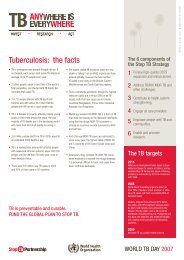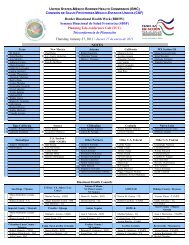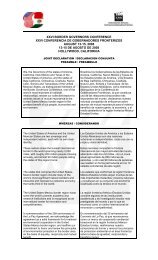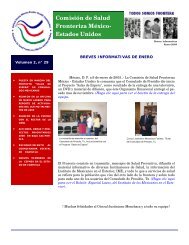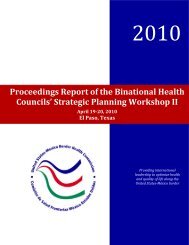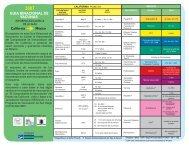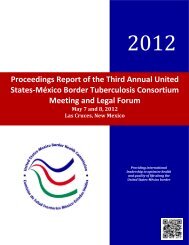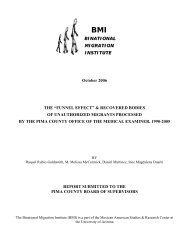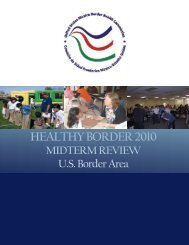National Healthcare Disparities Report - LDI Health Economist
National Healthcare Disparities Report - LDI Health Economist
National Healthcare Disparities Report - LDI Health Economist
You also want an ePaper? Increase the reach of your titles
YUMPU automatically turns print PDFs into web optimized ePapers that Google loves.
Highlights<br />
Examples of Initiatives Fostering Person- and Family-Centered Care<br />
Federal: In the first large-scale initiative to include patient experience in quality reporting, CMS encouraged<br />
hospitals to collect and publicly report information using the Hospital Consumer Assessment of<br />
<strong><strong>Health</strong>care</strong> Providers and Systems (HCAHPS) survey. The Affordable Care Act includes HCAHPS<br />
performance in calculating value-based incentive payments to hospitals and expands the use of patient<br />
experience information to assess physicians and other facilities, such as nursing homes<br />
(www.cms.gov/Hospital-Value-Based-Purchasing/). The <strong>Health</strong> Profession Opportunities Grants support<br />
education and training of low-income individuals in health care occupations that pay well and are expected to<br />
either experience labor shortages or be in high demand over the next 5 years<br />
(www.acf.hhs.gov/grants/open/foa/view/HHS-2010-ACF-OFA-FX-0126).<br />
State: As part of the Strategic Plan To Eliminate <strong>Health</strong> <strong>Disparities</strong> in New Jersey, the State worked to<br />
improve language access. In collaboration with the <strong>Health</strong> Research and Educational Trust of New Jersey,<br />
bilingual hospital staff were trained to be medical interpreters. The Office of Minority and Multicultural<br />
<strong>Health</strong> supported training for community leaders to help interpret or act as liaisons for minority clients<br />
navigating the health care system. In response to increasing requests for information by Spanish speakers,<br />
the Bureau of Vital Statistics hired bilingual staff, added a Spanish customer service phone line, and<br />
translated their Web site and forms into Spanish (www.state.nj.us/health/omh/plan).<br />
Provider: The Howard University Diabetes Treatment Center offers patients a free online personal health<br />
record to help monitor blood sugar and other clinical indicators, communicate with physicians between visits,<br />
and share health information. The program enhances levels of patient engagement in self-management and<br />
improves blood glucose control (HCIE #3081). The University of California San Francisco Breast Care<br />
Center Decision Services Unit offers a visit planning, recording, and summarizing service in which trained<br />
interns help patients brainstorm and write down a list of questions and concerns for their providers. The<br />
program improves patient-provider communication and patient self-efficacy and decisionmaking and reduces<br />
decisional conflict (HCIE #95).<br />
<strong>National</strong> Priority: Promoting Effective Communication and Coordination of Care<br />
Care coordination is a conscious effort to ensure that all key information needed to make clinical decisions is<br />
available to patients and providers. <strong>Health</strong> care in the United States was not designed to be coordinated.<br />
Patients commonly receive medical services, treatments, and advice from multiple providers in many<br />
different care settings, each scrutinizing a particular body part or system. Attending to the patient as a whole<br />
is rare. Less than sufficient provider-provider and provider-patient communication is common and may lead<br />
to delays in treatment and inaccuracies in medical information. Enhancing teamwork and increasing use of<br />
health information technologies to facilitate communication among providers and patients can improve care<br />
coordination.<br />
This NQS priority aligns well with the chapters on Care Coordination in the NHQR and NHDR. The NQS<br />
identifies several important opportunities for success in promoting effective communication and coordination<br />
of care: reducing preventable hospital admissions and readmissions, preventing and managing chronic illness<br />
and disability, and ensuring secure information exchange to facilitate efficient care delivery. The HHS<br />
20 <strong>National</strong> <strong><strong>Health</strong>care</strong> <strong>Disparities</strong> <strong>Report</strong>, 2011



